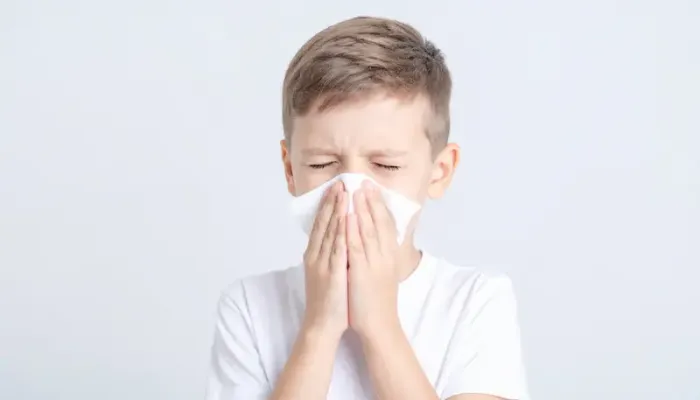Sinus Infection Causes From Colds to Chronic Issues
Explore the causes of sinus infections, from common colds and allergies to structural issues and chronic conditions. Learn how to prevent and manage sinusitis effectively.

Written by Dr. Md Yusuf Shareef
Reviewed by Dr. Rohinipriyanka Pondugula MBBS
Last updated on 13th Jan, 2026

Introduction
That familiar feeling of pressure building behind your cheeks, a headache that won't quit, and a nose that seems to be in a permanent state of congestion—welcome to the world of a sinus infection, or sinusitis. It's an incredibly common ailment, affecting millions each year, but what exactly triggers this uncomfortable condition? While a simple cold is often the starting point, the journey to a full-blown sinus infection is more complex. This article will demystify the causes, taking you beyond the basics to explore the intricate interplay of viruses, bacteria, underlying health conditions, and environmental factors that lead to blocked and inflamed sinuses. Understanding these root causes is the first step toward finding effective relief and preventing future episodes. Let's dive into the pathways that lead to sinusitis.
What is a Sinus Infection, Really?
At its core, a sinus infection is an inflammation or swelling of the tissue lining your sinuses. But to truly understand the causes, we first need to understand the normal, healthy state of your sinuses.
The Anatomy of Your Sinuses
Your sinuses are not just empty spaces in your skull; they are a connected system of hollow, air-filled cavities located behind your forehead, cheeks, and eyes. In a healthy state, these cavities are lined with a thin layer of mucus that traps dust, allergens, and germs. Tiny, hair-like structures called cilia then sweep this mucus gently toward the back of the throat, where it's swallowed unnoticed. This process keeps your sinuses clean and free of debris.
Inflammation: The Root of the Problem
A sinus infection begins when this delicate drainage system is disrupted. When the sinus openings (ostia) become blocked, mucus can't drain properly. It stagnates and builds up, creating a dark, moist environment that is a perfect breeding ground for viruses, bacteria, or fungi. This triggers an immune response, causing the sinus lining to become inflamed and swollen, which further blocks the drainage pathways. This vicious cycle of blockage, buildup, and inflammation is the fundamental mechanism behind the pain and pressure of sinusitis.
The Primary Culprits: Common Causes of Sinus Infections
The initial blockage that sets the stage for a sinus infection is most often caused by one of three types of microorganisms.
Viral Invaders: The Most Common Cause
The vast majority (over 90%) of acute sinus infections are viral in origin. When you catch a common cold or the flu, the virus causes inflammation in the nasal passages (rhinitis), which can easily spread to the sinus linings. This swelling blocks the sinus openings. The symptoms you experience are primarily from your body's immune response to the virus. It's crucial to understand that antibiotics are ineffective against viruses.
Bacterial Intruders: When an Infection Worsens
Sometimes, a viral sinus infection can create an opportunity for bacteria to thrive. When mucus is trapped for an extended period (typically more than 10 days), it can become a secondary bacterial infection. The symptoms of a bacterial sinus infection are often more severe and prolonged than viral ones, potentially featuring a high fever, thick green or yellow nasal discharge, and facial pain that worsens after an initial improvement (a "double-worsening" pattern). Common bacteria involved include Streptococcus pneumoniae and Haemophilus influenzae.Consult a Specialist for the best advice
Fungal Sinusitis: A Less Common but Serious Cause
Fungal sinus infections are rare and generally occur in people with compromised immune systems or those with significant fungal allergies. There are different types, ranging from a slow-growing fungal ball (mycetoma) in one sinus cavity to more invasive forms that can spread to the bones of the face or brain. These require specialised diagnosis and treatment by an ENT specialist.
Underlying Conditions That Pave the Way for Sinusitis
For some people, sinus infections are a recurring problem. This is often because an underlying condition creates a persistent state of vulnerability.
Allergies: The Constant Irritant
Allergies (allergic rhinitis) are a leading cause of chronic sinusitis. Exposure to allergens like pollen, dust mites, or pet dander causes chronic inflammation and swelling of the nasal and sinus tissues. This constant irritation narrows the sinus passages and impairs the cilia's ability to clear mucus, making it far easier for a simple cold to develop into a full-blown sinus infection.
Structural Issues in the Nose and Sinuses
Anatomical abnormalities can physically obstruct the narrow drainage pathways of the sinuses.
Deviated Septum
The septum is the wall of cartilage and bone that divides your nasal cavity. If it's significantly crooked (deviated), it can block sinus drainage on one or both sides, predisposing you to recurrent infections.
Nasal Polyps
These are soft, noncancerous growths that can develop in the lining of the nasal passages or sinuses due to chronic inflammation. Like grapes, they can grow large enough to block the sinus ostia, leading to persistent sinus pressure and infection.
Weakened Immune System
Conditions or medications that suppress your immune system can make you more susceptible to all types of infections, including sinusitis. This includes illnesses like HIV/AIDS, cancer treatments like chemotherapy, and long-term use of oral corticosteroids.
Lifestyle and Environmental Triggers
Your daily habits and environment can also play a significant role in triggering sinus infections.
Smoking and Air Pollution
Smoking, and even exposure to secondhand smoke, is extremely irritating to the entire respiratory tract. It paralyzes the cilia, damages the sinus lining, and increases inflammation, making smokers much more prone to sinus infections and slower to recover. Similarly, high levels of air pollution can have a comparable irritating effect.
Air Travel and Sudden Pressure Changes
You might not think of flying as a cause, but the rapid changes in air pressure during takeoff and landing can temporarily block the Eustachian tubes and sinus openings. If you already have a slight cold or allergies, this can be enough to trigger a painful sinus infection or sinus headache, often referred to as barosinusitis.
Key Differences: Acute vs. Chronic Sinus Infection Causes
Understanding the duration is key. Acute sinusitis is typically caused by a temporary trigger like a viral cold or a seasonal allergy flare-up. It usually resolves within 4 weeks. Chronic sinusitis, defined by symptoms lasting 12 weeks or more despite treatment, is more often linked to persistent, underlying issues. The causes of chronic sinusitis are usually a combination of factors, such as uncontrolled allergies, structural problems like nasal polyps, or an abnormal immune response to fungi in the environment.
When to Seek Professional Help
While many sinus infections resolve on their own, it's important to consult a doctor if your symptoms are severe, last longer than 10 days without improvement, or keep coming back. Warning signs include a high fever (over 102°F), severe headache, vision changes, or swelling around the eyes. If your symptoms persist beyond two weeks, consult a doctor online with Apollo24|7 for further evaluation. They can help determine if your infection is viral or bacterial and recommend the appropriate course of treatment, which may include prescription medications or a referral to a specialist.
Conclusion
A sinus infection is rarely caused by a single factor. It's typically a perfect storm where a trigger (like a cold) meets a vulnerable environment (such as inflamed sinuses from allergies or a structural blockage). By understanding the common pathways—from viral invaders and bacterial complications to the persistent irritation of allergies and environmental toxins—you can take proactive steps to protect your sinus health. Managing allergies effectively, avoiding irritants like smoke, and practising good hygiene to prevent colds are powerful strategies. Remember, listening to your body is crucial. If you suspect your sinus infection is becoming a chronic issue, seeking professional medical advice is the best step toward finding lasting relief and breathing freely again.Consult a Specialist for the best advice
Consult a Specialist for the best advice

Dr. Vikram V Mangalvedi
General Physician/ Internal Medicine Specialist
11 Years • MBBS. MD General Medicine DNB General Medicine
Bengaluru
Apollo Clinic, JP nagar, Bengaluru

Dr. Vivek D
General Physician
4 Years • MBBS
Bengaluru
PRESTIGE SHANTHINIKETAN - SOCIETY CLINIC, Bengaluru

Dr Shivaji Rao
General Physician/ Internal Medicine Specialist
30 Years • MBBS, MD, DNB
Bengaluru
Apollo Clinic, JP nagar, Bengaluru

Dr. Sougata Kumar
General Practitioner
8 Years • MBBS
East Midnapore
VIVEKANANDA SEBA SADAN, East Midnapore

Dr. Pinaki Mukhopadhyay
General Physician/ Internal Medicine Specialist
33 Years • MBBS
Kolkata
MCR SUPER SPECIALITY POLY CLINIC & PATHOLOGY, Kolkata
(25+ Patients)
Consult a Specialist for the best advice

Dr. Vikram V Mangalvedi
General Physician/ Internal Medicine Specialist
11 Years • MBBS. MD General Medicine DNB General Medicine
Bengaluru
Apollo Clinic, JP nagar, Bengaluru

Dr. Vivek D
General Physician
4 Years • MBBS
Bengaluru
PRESTIGE SHANTHINIKETAN - SOCIETY CLINIC, Bengaluru

Dr Shivaji Rao
General Physician/ Internal Medicine Specialist
30 Years • MBBS, MD, DNB
Bengaluru
Apollo Clinic, JP nagar, Bengaluru

Dr. Sougata Kumar
General Practitioner
8 Years • MBBS
East Midnapore
VIVEKANANDA SEBA SADAN, East Midnapore

Dr. Pinaki Mukhopadhyay
General Physician/ Internal Medicine Specialist
33 Years • MBBS
Kolkata
MCR SUPER SPECIALITY POLY CLINIC & PATHOLOGY, Kolkata
(25+ Patients)
More articles from Sinusitis
Frequently Asked Questions
1. Can a sinus infection go away on its own?
Yes, most viral sinus infections will resolve on their own within 10 to 14 days. Home remedies like saline rinses, steam inhalation, and rest can help manage symptoms during this time.
2. What is the difference between a sinus infection and a cold?
A common cold primarily affects the nose and throat, with symptoms peaking within 2-3 days. A sinus infection involves the sinuses, causing more localised symptoms like facial pain and pressure that often persist or worsen after a week.
3. How can I drain my sinuses naturally?
Using a saline nasal spray or a neti pot for a saline rinse is one of the most effective ways to flush out mucus and allergens. Inhaling steam from a shower or a bowl of hot water can also help loosen congestion and promote drainage.
4. Are sinus infections contagious?
The sinus infection itself is not contagious. However, if it was preceded by a cold or flu, the underlying virus that triggered it can be spread to others, who may then develop a cold or their own sinus infection.
5. When should I worry about a sinus headache?
You should seek medical attention if a sinus headache is extremely severe, is accompanied by a high fever, causes confusion or vision changes, or if the pain persists despite using over-the-counter pain relievers.




